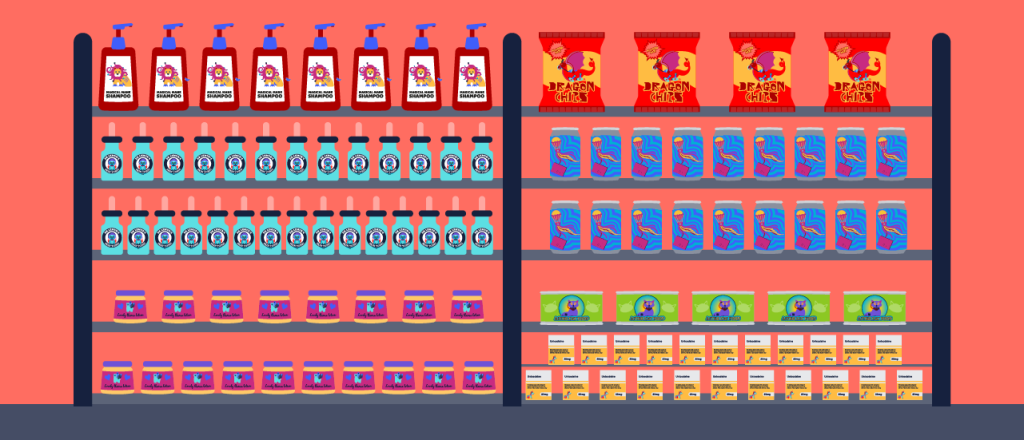Overflowing inventory and
the 90 day curse:
How your FMCG firm can overcome its challenges
Fast moving consumer goods (FMCG) are products sold at speed and at relatively low prices. They can include foods, beverages, toiletries, cosmetics, over-the-counter drugs and other consumables – often things that each of us eat, drink and use every day.
Yet the businesses that produce these goods – particularly if they are less established, growing businesses – can be plagued by financial challenges. Long payment terms, high production costs and inventory storage fees are just some examples, but the current economic climate has created additional pressure, squeezing cash flow and impacting growth.
If you are part of an FMCG brand, these challenges will be all too familiar, but there is a solution…
Does your business face any of these challenges?
1. Long payment terms are an industry standard
While the industry itself might be “fast-moving”, getting paid is often anything but. Long payment terms from retailers and wholesalers can mean your business might be owed up to 20% of your annual turnover at any one time.
This can be particularly problematic if you are a small, but growing company that is still trying to establish good relationships in your supply chain and manage early payment demands from certain suppliers.
2. High production costs
Production costs in this sector have always been high, particularly if you’re a smaller business that cannot benefit from bulk discounts, but the record inflation of the past two years has left businesses feeling the squeeze.
If your company does not have suitable cash reserves in place, it might be struggling to cover the extra costs.
3. Fierce competition
Competition within FMCG categories is stronger than ever, with huge numbers of emerging brands competing with market leaders for shelf space in supermarkets and to win consumer spending.
Whether your business is new to the market or a more established player, consistent innovation is necessary to ensure you keep up with competitors – but this can be costly. Expansion into new markets, research and development and product diversification requires capital, which might not be readily available.
4. Storing Inventory
Meeting D2C demand and last minute orders often means storing a significant value of inventory where it is readily available, but warehouse costs have been further exacerbated by firms trying to cope with global supply disruptions caused by Covid-19, the Suez Canal blockage and conflict in Ukraine.
Planning for contingencies by storing inventory is a great way to meet demand, but it sits on your balance sheet and hampers working capital, creating issues elsewhere.
5. Barriers to funding
Additional working capital is the answer to many of these challenges, but for FMCG businesses (especially those at an early stage,) accessing funding can be difficult.
With traditional lenders imposing strict lending criteria around debtor concentration and lacking an understanding of seasonal fluctuations, contractual challenges and the other obstacles facing FMCG firms, it can mean that non-specialist lenders are not equipped to support you in the right way.
Navigating these challenges: Funding is key
Many of the challenges above hamper your success because they squeeze cash flow and limit your opportunity to re-invest in growth.
From capital tied up in invoices to profit tied up in inventory, without cash to invest in product development, marketing spend or expanded teams and premises, FMCG firms can fail to make the leap from start-up to established business simply through a lack of readily available cash.
But advancing this cash is actually so simple – many businesses just don’t know it yet.
Advance cash without any long term commitments
Rather than committing to a traditional bank loan that ties you in for a set period of time and requires regular, consistent repayment – becoming yet another debt that you must manage – financial facilities that advance the cash you are already owed, puts money in your pocket without concern for where the repayment will come from.
- Invoice finance, for example, enables you to advance cash from individual invoices (and at Growth Lending we can do this for GBP, EUR and USD invoices, on a completely pay-as-you-go basis). So if you are awaiting a chunky payment from a debtor that is making you cautious about spending elsewhere, you could advance the cash with the peace of mind that it will be repaid by the debtor, rather than managing the repayment yourself.
- For more significant capital requirements – investment in a marketing campaign, new product development or expansion into a new market for example – leveraging multiple invoices or debtors might be a better solution. This is known as invoice discounting and while it does tie you in for longer than invoice finance, it still offers substantially more flexibility than conventional bank loans.
At Growth Lending we can provide funding of up to £2m by raising funds in this way – take a look at how the sparkling beverage brand DASH Water used this kind of working capital to support its broader growth strategy.
If you think differently, you need a lender that thinks differently too
Alternative lenders, as a general rule, will approach businesses like yours differently to the traditional banks, as they usually have more experience of the unique requirements of smaller, but fast-growing firms.
From debtor concentration to seasonal fluctuations, we’ve worked with many businesses like yours to enhance cash flow and accelerate growth.
To find out more, get in touch with one of our lending experts.




